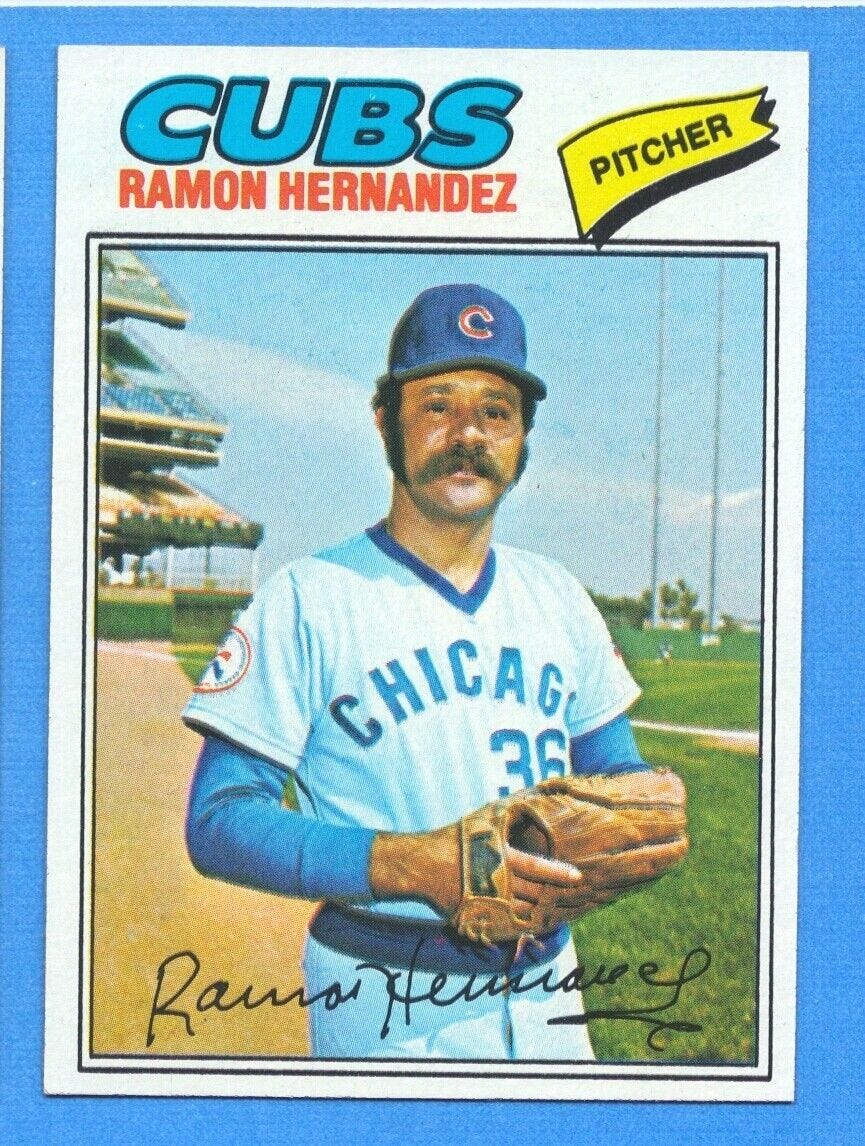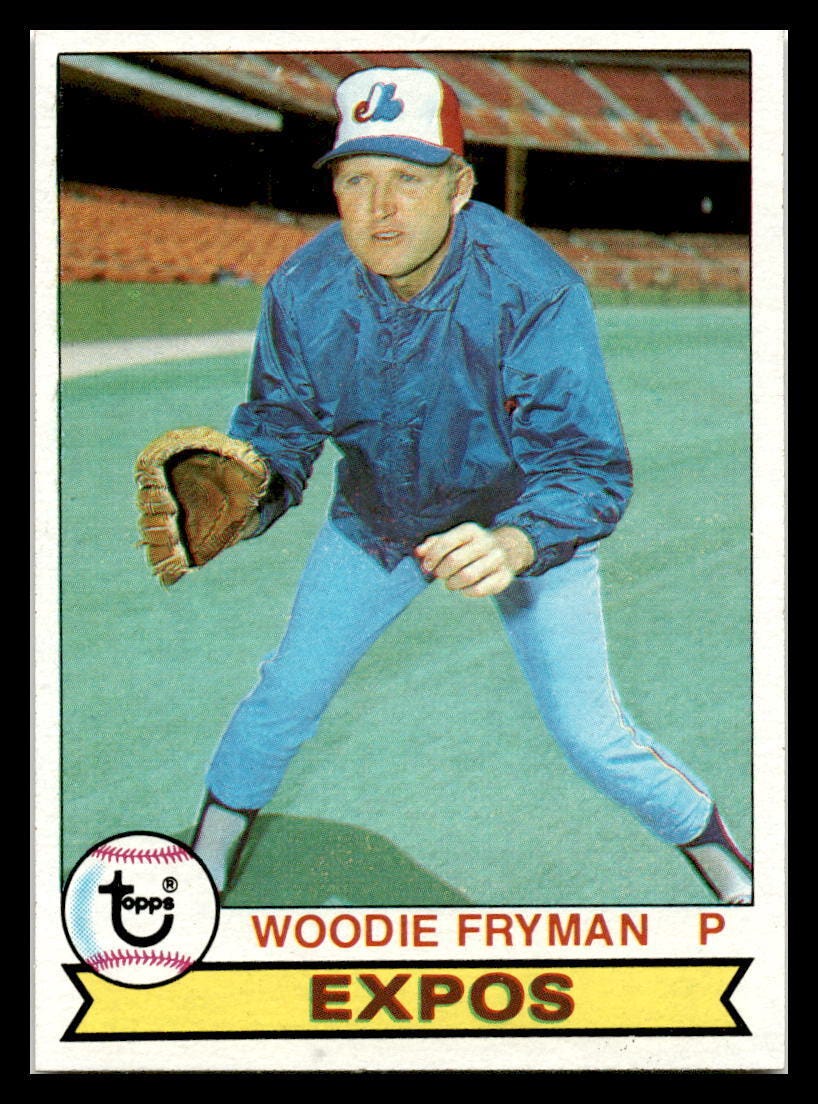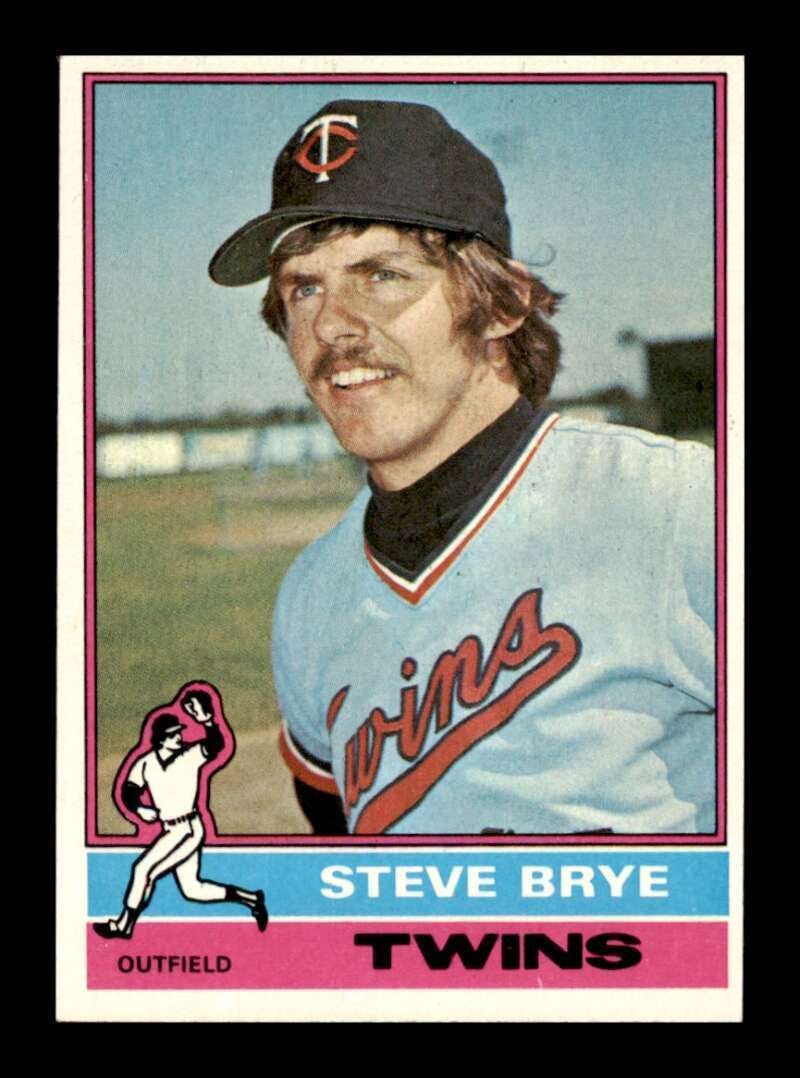It was only a couple of days into this writing project that I had to make a decision: What happens when someone from the dead box and someone from the living box share the same day? Who goes first? And the decision was, and always will be, that the ones who have left us on this earth should go first. I lead with the buried, even if it means—as is the case today—that I’m burying the lede. It just feels like the right thing to do.
The card above suggests that Ramon Hernandez, who passed away on this date in 2009 at the age of 68, played for the Cubs in the 1977 season. That’s technically true, if you count the six appearances he made early in the season. After a particularly bad outing in May that saw his ERA swell to 8.22, the Cubs traded him to Boston for Bobby Darwin, who we’ll meet later this month. But neither player lasted with his new team to the end of the season, and neither one played again in the majors after that.
Steve Barber’s major league service began in 1960, with the Baltimore Orioles. He won 20 games for them in 1963, while wearing the number 13 on his uniform. As an aside, I also wore 13 on my baseball uniform until my final season in the Khoury League, when I convinced my mom to sew the numbers onto my uniform as 31, instead. I think I played a bit better that year, too. Barber was nearing the end of his career when this card appeared in 1973, and he was out of the game a year later. He died of pneumonia on this date in 2007, at the age of 68.
Woodie Fryman pitched for 18 seasons in the majors, but one game stands out for me, and I wonder if it did for him, as well. On a Friday night at Shea Stadium in 1966, Fryman pitched for a the Pittsburgh Pirates and surrendered a leadoff single to Ron Hunt. Hunt was then caught stealing second base, and Fryman retired the next 26 Mets batters in a row. He came within one batter of a perfect game, which would have given him an accomplishment that very few pitchers have ever enjoyed. But as it was, it was only a one-hit shutout. Fryman retired from the game after the 1983 season, at the age of 43, and passed away on this date in 2011 at the age of 70. So it goes.
I want to preface the story of Steve Brye, who’s celebrating his 75th birthday today, with a reference to the Rocky movies (and I said this yesterday, but R.I.P. to Carl Weathers). When the first sequel was filmed, which was probably never intended when the original was filmed in 1976, Rocky heard some chatter that the fight only went the way it did because Apollo Creed didn’t give his best effort in the ring.
Rocky wanted to hear it from Apollo himself, so he went to Apollo’s hospital room and asked if he gave his best in the fight. Apollo replied that he did, and Rocky thanked him for that. And then the buildup to the rematch at the end of the movie began.
With that moment in mind, and while the first Rocky movie was being shot in 1976, two batting title races came down to the final day of the season. Not only did this happen in the National League, with Bill Madlock and Ken Griffey, but also in the American League. This one seems too bizarre to have ever been scripted, and the events that unfolded in Royals Stadium that day were entirely real.
Going into the last day of the season on October 3, two teammates on the Kansas City Royals, George Brett and Hal McRae, were separated by less than a single batting average point. McRae was in the lead at .330783 (173 hits in 523 official at bats), while Brett was at .330733 (212 hits in 641 official at bats). When you have to go out to the fifth decimal place, that’s about as close as it gets.
To win the AL batting title, Brett needed to get one more hit than McRae did. And the Royals manager, Whitey Herzog, could have sat one or both players, to give them some rest for the upcoming playoff series against the Yankees. But he played them both, so that they could settle the issue on the field. Even better, he hit Brett immediately in front of McRae in the lineup. This meant that Brett had to try for a hit with every at bat, while McRae would know what he needed to do each time he stepped into the batter’s box.
Brett lined out to end the first inning, and McRae flied out to centerfield to start the second inning. McRae still held the lead at that point. Brett then doubled in a run in the fourth inning to take a brief lead, but was thrown out trying to stretch it into a triple. McRae then singled, to give himself the lead once again.
When Brett led off the bottom of the seventh with a double (stopping at second this time), he again took the lead in the batting race. McRae then singled in Brett, to retake the lead by the slimmest of margins. While the paid attendance for this game was less than 16,000, I hope that the fans who were there that day were aware of the extraordinary back-and-forth that was going on. Perhaps the radio audience was aware as well, but the game apparently was not being televised, because that’s how life was back in 1976.
The game went into the ninth inning with the visiting Twins holding a 5-2 lead. The irony is that had the Royals been in the lead instead, the batting race would have already been over, since neither Brett or McRae would have needed to bat again. But Brett was due to hit second, and McRae third in the bottom of the ninth, so the matter was going to be decided, one way or the other.
Amos Otis flew out to start the inning, and George Brett came to bat with a simple task: get a hit and retake the lead over McRae. Fail, and the race would be over on the spot. What happened next is in dispute, and the lack of any video footage means we’ll never have a clear view of what transpired.
In the words of Steve Brye, who was playing left field for the Twins that day, he was told to play deep against Brett. Brett was not a power hitter, and had just seven home runs in the 1976 season. With a three run lead and no Royals on base, how concerned could the Twins be about giving up an extra base hit in a meaningless game on the last day of the season? But Brye moved back, as his manager had instructed.
George Brett lifted a fly ball to left field, in the direction of Brye. Whether Brye was playing out of position at Mauch’s direction, or whether he broke the wrong way on the ball, or whether he simply stopped running toward the ball, it fell in for a hit. It then bounded over Brye’s head, allowing Brett to circle the bases for an inside-the-park home run.
If an error had been charged to Brye on the play, it would not have helped Brett’s average or allowed him to pass McRae for the batting title lead. But since the ball was not touched before hitting the ground, Brett found himself leading the American League with a .333333 average. Hal McRae then stepped in with a .332670 average. A hit would edge him ahead of Brett, while an out (or even a walk or an HBP) would have given Brett the batting title. As you might be able to guess, McRae didn’t get a hit, grounding out to the shortstop, instead.
McRae, understandably, was angry at Gene Mauch for directing Brye to play deep in that situation. Mauch claimed that this allegation was the worst thing he experienced in baseball, but it’s naive to think he would have owned up to such a thing, either. McRae, for his part, seemed to be convinced that the ball which Brett hit was allowed to drop on purpose. And it wasn’t a good purpose, either.
Which leads me back to the Rocky and Apollo Creed moment that I started off with. I can’t see where Brye ever definitely told anyone if he gave his best effort to catch Brett’s flyball in the ninth inning that day, more than 48 years ago. We can’t watch any video to decide for ourselves, and Brye is the only one who truly knows the answer to this. I hope he will give an affirmative answer, one way or the other, while McRae (who’s 78 now) and Brett (who is 70) are still here to find out what it is.
That’s all for today. I’ll be back again tomorrow…






That’s a great entry - and woody fryman! Holy memories of childhood, Batman!
The Griffey/Maddox thing was in my line of sight and i remember it. Brett/McRae came later. It had to be a SI article. Or the Sporting News.
I loved Griffey as a Red, just like Conception, Foster, Geronimo and the rest. They were so memorable. Even for a kid from LA.
The only one I’ve never had time for is Pete. Because F that guy.